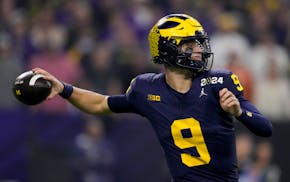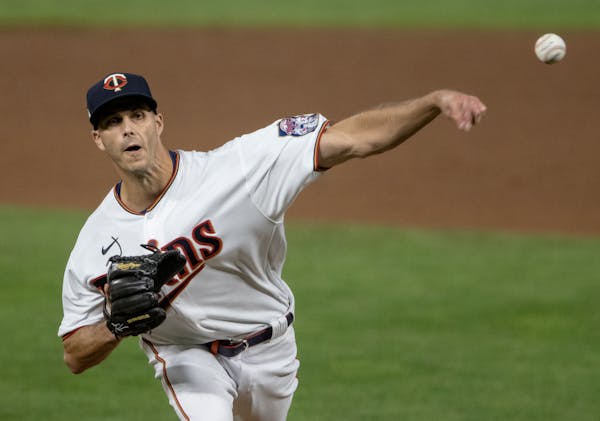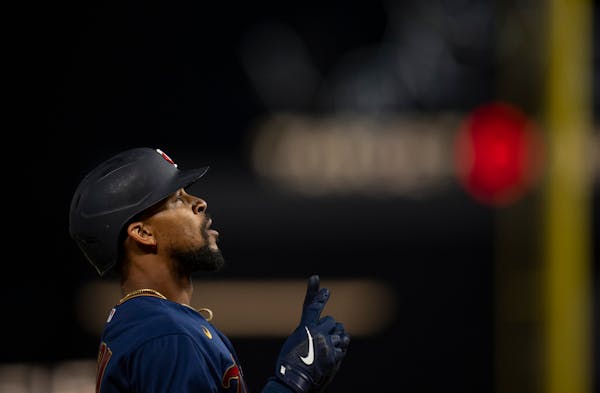The Twins had only one palatable option when it came to Byron Buxton.
For all of his injuries and slumps, Buxton is one of the most talented players in baseball, and he has a chance to become one of the greatest players in baseball. The Twins don't get many chances to employ someone of his ability.
Signing him to a seven-year contract worth $100 million plus incentives is a good deal for the team. If Buxton is relatively healthy, he will be worth much more than about $15 million a year. If he's not healthy, the Twins will have thrown away the kind of money they would otherwise spend on middle-of-the-road starting pitchers.
Buxton is the rare player in baseball who elevates everyone around him. He saves runs with his glove, allows lesser players to patrol the corner outfield positions without costing their team, comforts pitchers, creates runs on the bases, limits opponents running with his arm, and can produce like a middle-of-the-order slugger.
Since 2019, when Buxton is healthy, the Twins win 63% of their games. When he is unavailable, they win 44% of their games.
If the Twins had let Buxton go, when would they be able to acquire someone like him again?
They were able to draft him only because they were so frighteningly bad in 2011 that they received the second pick in the 2012 draft, and he fell to the second pick only because the Astros chose Carlos Correa with the first.
The Twins aren't going to sign the best free agent available on the market, now or ever, and they aren't likely to be so horrific that they will wind up with a top-two draft pick anytime soon, and baseball is unkind even to top picks.
If the Twins had traded Buxton, they probably would have received players who will never be as talented or dominant as he is, because of his injury history.
Credit both parties for constructing a reasonable, intelligent deal.
Buxton is set for life. So are his children, and their children.
He will make plenty of money in base salary, and if he stays healthy and receives MVP votes — and one would almost certainly lead to the other — he will earn like a star.
We might not know for months whether the Twins are engaging in a stealth rebuild or trying to win in 2022. What they shouldn't do is waste years of Buxton's prime on teams that have no chance to win.
Having cost certainty with Buxton should encourage the Twins' brain trust to venture into the free-agent pitching market. Prices for quality arms have not been outrageous. One closer and a couple of competitive starters would at least give the Twins a fighting chance, and if they had a lucky year in terms of injuries, a lineup featuring Buxton, Josh Donaldson, Jorge Polanco and Mitch Garver could again be dangerous.
While Buxton's injury history makes any nine-figure deal look risky, he is low-risk in other ways. He is a dedicated, grounded athlete. He is devoted to his family. He is a beloved teammate.
He's not the vocal leader that Kirby Puckett or Torii Hunter was, at least not yet, but leadership in baseball can be overrated — often "leadership'' is an attribute bestowed after the fact upon the best players on winning teams.
Buxton has curbed his old tendency to run full speed into outfield walls, and many of his non-collision injuries have been a matter of bad luck.
One of Buxton's earliest mentors, Paul Molitor, averaged 113 games played for the first 10 years of his career. For his last 11 years, he averaged 141. Being "injury-prone'' is not necessarily a life sentence.
A sound rule in any competitive field is "Don't do anything your rivals would want you to do.'' The rest of the AL Central wanted the Twins to trade Buxton.
Keeping him around gives the Twins a fighting chance to compete, if they can add even competent starting pitching.

Souhan: Wolves fans made Game 1 special. Now bring on Game 2.

Souhan: Should Vikings even consider McCarthy in NFL draft?

Souhan: NAW erases Suns' lead, Game 1 advantage with big performance

Souhan: This is KAT's chance to prove Flip Saunders was right



